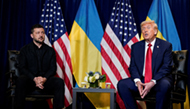▶ THOMAS L. FRIEDMAN
Observing all this joie de vivre, I thought to myself: “Wow, wouldn’t it be nice to be a Swiss? Maybe even to sport some pink hair?” Though I can’t say for sure, I got the feeling that the man with pink hair was not agonizing over the proper use of force against Bashar al-Assad. Not his fault; his is a tiny country. I guess worrying about Syria is the tax you pay for being an American or an American president — and coming from the world’s strongest power that still believes, blessedly in my view, that it has to protect the global commons. Barack Obama once had black hair. But his is gray now, not pink. That’s also the tax you pay for thinking about the Middle East too much: It leads to either gray hair or no hair, but not pink hair.
Well, bring on the Grecian Formula, because our leaders will need it. My big take-away from the whole Syria imbroglio is that — with Europe ailing, China AWOL and the Arab world convulsing — for an American president to continue to lead will require more help from Vladimir Putin, because our president will get less help from everyone else, including the American people. Everyone is focusing on Obama’s unimpressive leadership in this crisis, but for my money the two main players who shaped the outcome — in ways that would not have been predicted but will have huge long-term implications — were Putin and the American people. Obama got blindsided by both. What does it tell us?The fact that Americans overwhelmingly told Congress to vote against bombing Syria for its use of poison gas tells how much the divide on this issue in America was not left versus right, but top versus bottom. Intervening in Syria was driven by elites and debated by elites. It was not a base issue. I think many Americans could not understand why it was O.K. for us to let 100,000 Syrians die in a civil war/uprising, but we had to stop everything and bomb the country because 1,400 people were killed with poison gas. I and others made a case why, indeed, we needed to redraw that red line, but many Americans seemed to think that all we were doing is drawing a red line in a pool of blood. Who would even notice?Many Americans also understood that when it came to our record in the Arab/Muslim world since 9/11, we were 0 for 3. Afghanistan seems headed for failure; whatever happens in Iraq, it was overpaid for; and Libya saw a tyrant replaced by tribal wars. I also think a lot of people look at the rebels in Syria and hear too few people who sound like Nelson Mandela — that is, people fighting for the right to be equal citizens, not just for the triumph of their sect or Shariah. It’s why John McCain’s soaring interventionist rhetoric was greeted with a “No Sale.” I also think the public picked up on Obama’s ambivalence — his Churchillian, this-must-not-stand rhetoric, clashed with his “On second thought, I’m going to ask Congress’s permission before I make a stand, and I won’t call lawmakers back from vacation to do so.” The bombing was going to be bigger than a “pinprick” but also “unbelievably small.” It just did not add up.
Finally, there was an “Are you kidding?” question lurking beneath it all — a sense that with middle-class incomes stagnating, income gaps widening and unemployment still pervasive for both white- and blue-collar workers, a lot of Americans were asking: “This is the emergency you are putting before Congress? Syria? Really? This is the red line you want to draw? I’m out of work, but this Syria thing is what shall not stand?”As for Putin, if he had not intervened with his proposal to get Syria to surrender all its chemical weapons, Obama would have had to either bomb Syria without Congressional approval or slink away. So why did Putin save Obama? In part, no doubt, because he felt the only way he could save his client, the Syrian president, was by also saving the American president. But the bigger factor is that Putin really wants to be seen as a big, relevant global leader. It both feeds his ego and plays well with his base. The question now is: With the American people sidelined and Putin headlined, can we leverage Putin’s intervention to join us in also forging a cease-fire in Syria and maybe even move on to jointly try to end the Iran nuclear crisis.
I agree with Obama on this: no matter how we got here, we’re in a potentially better place. So let’s press it. Let’s really test how far Putin will go with us. I’m skeptical, but it’s worth a try. Otherwise, Obama’s hair will not just be turned gray by the Middle East these next three years, he’ll go bald.
스마터리빙
more [ 건강]
[ 건강]이제 혈관 건강도 챙기자!
[현대해운]우리 눈에 보이지 않기 때문에 혈관 건강을 챙기는 것은 결코 쉽지 않은데요. 여러분은 혈관 건강을 유지하기 위해 어떤 노력을 하시나요?
 [ 건강]
[ 건강]내 몸이 건강해지는 과일궁합
 [ 라이프]
[ 라이프]벌레야 물럿거라! 천연 해충제 만들기
 [ 건강]
[ 건강]혈압 낮추는데 좋은 식품
[현대해운]혈관 건강은 주로 노화가 진행되면서 지켜야 할 문제라고 인식되어 왔습니다. 최근 생활 패턴과 식생활의 변화로 혈관의 노화 진행이 빨라지고
사람·사람들
more많이 본 기사
- 한인 식당서 이콜라이 집단 식중독
- 젤렌스키 “28일 트럼프와 회담…안보·민감 문제 논의”
- 2026년 변경되는 소셜연금
- 펠로시 딸도 부시 사촌도…정치인 2세 등 내년 선거 출사표
- 트럼프, ‘성탄절 D-데이’ 나이지리아內 IS 공습 배경은
- 뼈 건강에 커피가 더 좋을까, 차가 더 좋을까?
- NYT “美각료·기관 성탄 메시지, 정교분리 원칙 위배 논란”
- 무면허 건축업자 ‘계약사기’ 집중 단속
- 中, 美군수기업·경영진 무더기 제재…對대만 무기판매 보복
- 미성년자와 성관계 체조코치 체포
- 내년 보험료 급등 우려 오바마케어 가입 감소
- 관세폭풍 여파… “통관강화속 소포 파손·폐기·배송지연 속출”
- 2025 한인사회 10대 뉴스
- 국제은값 폭등에 개인투자자들 銀투자 대거 유입
- “출생시민권은 사기”⋯ 이민 2세대 공격 초점 맞춘 트럼프
- ‘손흥민 vs 메시’… 2026 MLS 개막전서 세기의 맞대결 예고
- 한인 교계 일제히 성탄 축하 특별예배
- 초강력 폭풍우 피해 속출… 3명 사망
- 트럼프 관세에…고급 와인 시장도 ‘휘청’
- 살림으로 뿌리내리다- 테이크루트 안미정 대표의 요리 이야기 (8)
- 우크라이나 포로수용소의 북한군인 동무들에게
- 특검, 김건희 ‘매관매직’ 추가기소… ‘尹 뇌물’ 수사는 경찰로
- “이재명 부친 야반도주” 주장한 전직… 1
- KCCEB, 새이름 ‘마루’로 재탄생
- ‘18억불’ 잭팟 터졌다 파워볼 1등… 1
- ‘서지승♥’ 이시언, 마흔 넷에 아빠 된다..2세는 아들 ‘암시’
- 린다 한 “내년 1월17일 별도 한인회연합회 만들겠다”
- 곽튜브, 재산 100억설에 입 열었다.. “얼마 안 남은 듯”
- 尹내란재판 1월16일 첫선고…특검, 체포방해 등 징역 10년 구형
- “현대판 노예 같았다” J-1 비자 악용 속출
- ‘아픈데 돈도 없다’ 한국 노인 소득빈곤율 OECD 1위
- VA·MD 7명 생굴 먹고 식중독…22개주 60여명 감염
- 한미장학재단에 3만달러 영구장학금 기탁
- “연말은 스트레스·새해 결심은 없다”
- ‘긴급 렌트비 보조’ LA카운티 접수 시작
- 한인 2세, 드라마 ‘런’ 주연 맡아
- 탑여행사 추천 여행지-도시 자체가 박물관인‘피렌체’
- ‘학자금 상환’ 안하면 임금압류
- ‘손흥민 vs 메시’ 2026 MLS 개막전서 세기의 맞대결 예고
- 뉴욕한인회, 이번에 이사장 자리 놓고 내홍 조짐
- 기이한 재력 과시 ‘가난 밈’ 확산에..신화 김동완 “이게 농담이라고?” 뿔났다
- 2025 미국·세계 10대 뉴스
- 크리스마스 연휴… 오픈한 샤핑몰 ‘북적’
- ICE 버지니아 구금시설 ‘포화’…수감자 역대최고
- 의료비 상승과 건강플랜 대책
- 물류거점창고에 불체자 8만명 수용 추진
- [새해부터 이렇게 달라진다] 최저임금 또 오르고… 유급 병가는 더 확대
- 조지아 역주행 사고, 한인남편 이어 임신 아내도 사망
- “반갑다 상승 정체”… 11월 주택 판매량 3년래 최고
- 수백억 제작비 파격 선지급… 오겜·킹… 1
1/5지식톡

-
 미 육군 사관학교 West Poin…
0
미 육군 사관학교 West Poin…
0https://youtu.be/SxD8cEhNV6Q연락처:wpkapca@gmail.comJohn Choi: 714-716-6414West Point 합격증을 받으셨나요?미 육군사관학교 West Point 학부모 모…
-
 ☝️해외에서도 가능한 한국어 선생님…
0
☝️해외에서도 가능한 한국어 선생님…
0이 영상 하나면 충분합니다!♥️상담신청문의♥️☝️ 문의 폭주로 '선착순 상담'만 진행합니다.☎️ : 02-6213-9094✨카카오톡ID : @GOODEDU77 (@골뱅이 꼭 붙여주셔야합니다…
-
 테슬라 자동차 시트커버 장착
0
테슬라 자동차 시트커버 장착
0테슬라 시트커버, 사놓고 아직 못 씌우셨죠?장착이 생각보다 쉽지 않습니다.20년 경력 전문가에게 맡기세요 — 깔끔하고 딱 맞게 장착해드립니다!장착비용:앞좌석: $40뒷좌석: $60앞·뒷좌석 …
-
 식당용 부탄가스
0
식당용 부탄가스
0식당용 부탄가스 홀세일 합니다 로스앤젤레스 다운타운 픽업 가능 안녕 하세요?강아지 & 고양이 모든 애완동물 / 반려동물 식품 & 모든 애완동물/반려동물 관련 제품들 전문적으로 홀세일/취급하는 회사 입니다 100% …
-
 ACSL 국제 컴퓨터 과학 대회, …
0
ACSL 국제 컴퓨터 과학 대회, …
0웹사이트 : www.eduspot.co.kr 카카오톡 상담하기 : https://pf.kakao.com/_BEQWxb블로그 : https://blog.naver.com/eduspotmain안녕하세요, 에듀스팟입니다…
케이타운 1번가
오피니언

새해 더 중요해지는 노동법 준수

연말연시, 안전하고 차분하게
 캐슬린 파커 워싱턴포스트 칼럼니스트
캐슬린 파커 워싱턴포스트 칼럼니스트 [캐슬린 파커 칼럼] 지미 라이의 마지막 희망
 유경재 나성북부교회 담임목사
유경재 나성북부교회 담임목사 [한국춘추] 미국의 힘
 전병두 서북미수필가협회 회원
전병두 서북미수필가협회 회원 [금요단상] 비자 발급
 박일근 / 한국일보 수석논설위원
박일근 / 한국일보 수석논설위원 [지평선] 스님의 주례사
 신상철 / 고려대 고고미술사학과 교수
신상철 / 고려대 고고미술사학과 교수 [미술 다시보기] 신의 모습을 닮고자 한 예술가
 스티브 강 전 한인민주당협회 회장
스티브 강 전 한인민주당협회 회장 [스티브 강 ‘인사이드 미국’] 2026 중간선거: 트럼프 지지율 하락이 말해주는 것
 김홍일 케이유니콘인베스트먼트 대표
김홍일 케이유니콘인베스트먼트 대표 [기고] 안정의 기준은 어떻게 제도가 되었나
1/3지사별 뉴스

물류거점창고에 불체자 8만명 수용 추진
도널드 트럼프 행정부가 이민자 구금·추방을 효율화하기 위해 전국 물류거점 창고에 8만명 규모의 수용시설 확보를 추진한다고 24일 워싱턴 포스트…
‘학자금 상환’ 안하면 임금압류

“온 세상에 희망·평화의 빛 스며들길”
가자지구와 우크라이나에서의 전쟁, 고립과 불평등으로 세상이 어지러운 가운데 워싱턴 지역 각급 한인교회와 성당들이 성탄절을 맞아 일제히 예배와 …
“연말은 스트레스·새해 결심은 없다”

‘손흥민 vs 메시’ 2026 MLS 개막전서 세기의 맞대결 예고
LA 풋볼클럽(LAFC)가 2026시즌 MLS 정규리그 일정을 공식 발표하며 한인 축구 팬들의 시선을 한몸에 받고 있다. LAFC는 오는 20…
[새해부터 이렇게 달라진다] 최저임금 또 오르고… 유급 병가는 더 확대

오늘 하루 이 창 열지 않음 닫기 





















































.png)


댓글 안에 당신의 성숙함도 담아 주세요.
'오늘의 한마디'는 기사에 대하여 자신의 생각을 말하고 남의 생각을 들으며 서로 다양한 의견을 나누는 공간입니다. 그러나 간혹 불건전한 내용을 올리시는 분들이 계셔서 건전한 인터넷문화 정착을 위해 아래와 같은 운영원칙을 적용합니다.
자체 모니터링을 통해 아래에 해당하는 내용이 포함된 댓글이 발견되면 예고없이 삭제 조치를 하겠습니다.
불건전한 댓글을 올리거나, 이름에 비속어 및 상대방의 불쾌감을 주는 단어를 사용, 유명인 또는 특정 일반인을 사칭하는 경우 이용에 대한 차단 제재를 받을 수 있습니다. 차단될 경우, 일주일간 댓글을 달수 없게 됩니다.
명예훼손, 개인정보 유출, 욕설 등 법률에 위반되는 댓글은 관계 법령에 의거 민형사상 처벌을 받을 수 있으니 이용에 주의를 부탁드립니다.
Close
x